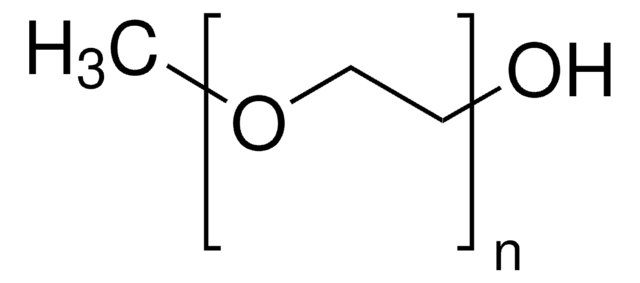84797
Poli(etilenglicol)
BioUltra, 2,000
Sinónimos:
PEG
About This Item
Productos recomendados
Nivel de calidad
Línea del producto
BioUltra
formulario
powder
mol peso
Mr 1900-2200
impurezas
insoluble matter:, passes filter test
≤0.001% peroxides (as H2O2):
pH
5.5-7.0 (25 °C, 50 mg/mL in H2O)
mp
50-53 °C
solubilidad
H2O: 50 mg/mL at 25 °C, clear, colorless
trazas de anión
chloride (Cl-): ≤50 mg/kg
sulfate (SO42-): ≤50 mg/kg
trazas de catión
Al: ≤5 mg/kg
As: ≤0.1 mg/kg
Ba: ≤5 mg/kg
Bi: ≤5 mg/kg
Ca: ≤10 mg/kg
Cd: ≤5 mg/kg
Co: ≤5 mg/kg
Cr: ≤5 mg/kg
Cu: ≤5 mg/kg
Fe: ≤5 mg/kg
K: ≤200 mg/kg
Li: ≤5 mg/kg
Mg: ≤5 mg/kg
Mn: ≤5 mg/kg
Mo: ≤5 mg/kg
Na: ≤200 mg/kg
Ni: ≤5 mg/kg
Pb: ≤5 mg/kg
Sr: ≤5 mg/kg
Zn: ≤5 mg/kg
λ
50 mg/mL in H2O
Absorción UV
λ: 260 nm Amax: ≤0.1
λ: 280 nm Amax: ≤0.04
cadena SMILES
C(CO)O
InChI
1S/C2H6O2/c3-1-2-4/h3-4H,1-2H2
Clave InChI
LYCAIKOWRPUZTN-UHFFFAOYSA-N
¿Está buscando productos similares? Visita Guía de comparación de productos
Descripción general
Aplicación
- as a constituent in the preparation of liquid desiccant solutions
- as a precipitating agent and additive in protein crystallization
- as a representative biocompatible polymer to decipher its interactions with cellular system at molecular level
Código de clase de almacenamiento
11 - Combustible Solids
Clase de riesgo para el agua (WGK)
WGK 1
Punto de inflamabilidad (°F)
281.5 °F - closed cup
Punto de inflamabilidad (°C)
138.6 °C - closed cup
Equipo de protección personal
Eyeshields, Gloves, type N95 (US)
Certificados de análisis (COA)
Busque Certificados de análisis (COA) introduciendo el número de lote del producto. Los números de lote se encuentran en la etiqueta del producto después de las palabras «Lot» o «Batch»
¿Ya tiene este producto?
Encuentre la documentación para los productos que ha comprado recientemente en la Biblioteca de documentos.
Los clientes también vieron
Nuestro equipo de científicos tiene experiencia en todas las áreas de investigación: Ciencias de la vida, Ciencia de los materiales, Síntesis química, Cromatografía, Analítica y muchas otras.
Póngase en contacto con el Servicio técnico
